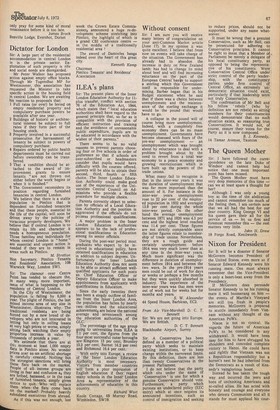Sir: I am sure you will receive many letters of
congratulation on your anti-Common Market article (June 17). In my opinion it was quite excellent. I believe that from now on events will take charge of the situation. The Government has already had to abandon the increase in duty on New Zealand Iamb; has had to change its mind about beef and will find increasing reluctance on the part of the European Central-ban!Is to support a sterling which this Government itself is responsible for undermining. Barber began that in his Budget statement when he said that if there was a choice between unemployment and the maintenance of the sterling exchange it would be the pound that would have to go.
A collapse in the pound will of course bring more unemployment. Indeed, with a completely free economy there can be no mass unemployment. Governments have become obsessed with fears of the pre-war unemployment — an unemployment which was brought about by reluctance to deal with a problem brought about by the need to revert from a total war economy to a peace economy and growing restrictionism which in turn built up the powers of the trade unions.
What many fail to recognise is that in the inter-war years it was the duration of unemployment that was far more important than the amount of it. For instance in the inter-war years unemployment rose to 22 per cent of the employed population in 1932 and averaged 13.9 per cent during the whole inter-war period. On the other hand the average unemployment between 1871 and 1926 was 4.5 per cent and the highest level reached was 11.4 per cent. These figures are not strictly comparable since the latter figures relate to membership of trade unions. Nevertheless, they are a rough guide and certainly unemployment before 1914 was very much lower than at any time in the inter-war years. Much more significant was the difference in duration of unemployment before 1914 and between the two wars. In the pre-1914 years men could be out of work for days or weeks or perhaps a few months but they were quickly absorbed in industry. The experience of the inter-war years was that men were out of work not for weeks but for months and years.
S. W. Alexander 44 Speed House, Barbican, EC2.










































 Previous page
Previous page